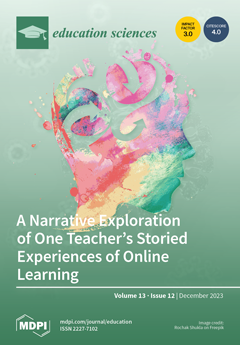Despite the known benefits of social-emotional learning (SEL) for children, evidence-based, culturally sensitive, and multisensory SEL programs are limited. To address existing challenges in SEL for underprivileged youth, we developed the multicomponent B.E. M.Y. F.R.I.E.N.D. (BMF) framework that capitalizes on (1) cultural tailoring
[...] Read more.
Despite the known benefits of social-emotional learning (SEL) for children, evidence-based, culturally sensitive, and multisensory SEL programs are limited. To address existing challenges in SEL for underprivileged youth, we developed the multicomponent B.E. M.Y. F.R.I.E.N.D. (BMF) framework that capitalizes on (1) cultural tailoring to foster acceptability, (2) tools and strategies to build healthy habits, (3) parental engagement using the Child-Mediated Health Communication Model, (4) social engagement of teachers via peer interaction during learning experiences, and (5) multisensory learning. Each letter (component) of the BMF stands for a unique SEL skill. To test the BMF framework, we developed a proof of concept (POC) focused on one component of the BMF—mindfulness and gratitude SEL (M-letter). The POC includes a description of immersive and interactive multimedia modules with tailor-made music, digital games, cartoons, and booster activities. The outcomes from the POC will inform the development of fully powered randomized studies of each component of BMF and, ultimately, the implementation and dissemination of the entire BMF program. The Multisensory Multilevel Health Education Model (MMHEM) guided the design of the program. In the POC, we used a learning management system (LMS) platform to facilitate program scalability. The modules encompassed culturally and age-relevant real-world examples and were digitized and integrated with traditional learning approaches. This article presents qualitative and quantitative data evaluating feasibility, preliminary acceptability, and preliminary outcomes from the mindfulness and gratitude modules (letter “M” of the BMF). The studies were conducted with 4th and 5th-grade students (Studies 2–4) attending a New York City public school-affiliated after-school program in the Bronx and Queens and their teachers (Study 1).
Study #1 presents the focus group data on teachers and principals;
Study #2 shows the focus group data on minoritized students;
Study #3 presents data from the pilot testing of study-specific outcome measures; and
Study #4 presents data on the preliminary efficacy of the BMF mindfulness and gratitude modules using a within-subjects repeated measures pre-posttest study design. Results suggest that the “M” component (mindfulness and gratitude) of the BMF framework is feasible and highly engaging among minoritized children, with high acceptability among teachers and students. We also found a positive impact of the intervention on measures of gratitude and life satisfaction (preliminary efficacy).
Full article





